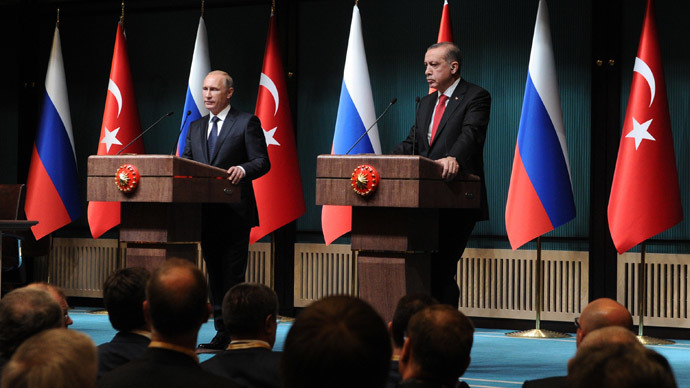‘Turkey and Russia split politics from economics’

Moscow and Ankara do not really see eye to eye on politics, but despite that have big economic potential, with Turkey considering itself an in-between partner who would take gas from Russia to Europe, Martin McCauley of the University of London, told RT.
READ MORE: Putin: Russia forced to withdraw from S. Stream project due to EU stance
RT:There are obvious political differences between Russia and Turkey but it didn’t seem to get in the way of doing some major trade deals today. Do you think it was a surprise?
Martin McCauley: No, that wasn’t a surprise because in international relations you separate politics from economics, and politics sometimes trumps economics but quite often economics carry on with political differences. Obviously in Syria the two sides see the situation quite differently because President Erdogan wants the West to take down President Assad first and then he will help America and Britain and so on to take down Islamic State. But President Putin, on the other hand … says [President Assad] should not be overthrown. So that is from the political point of view they are poles apart, but from the economic point of view this gas deal, the atomic power plant that is going to be built - that has been on the cards for quite a long time…They could have a gas pipe through Turkey, and Turkey would like the gas pipeline to go through Turkey because then it collects the rent from it. And also Turkey would like to pipe natural gas from Iran through Turkey to the West. But that of course is blocked by sanctions at present. So Turkey sees itself as the in-between partner who will take gas from Iran and Russia to Europe.
RT:Did the latest Russian-Turkish news conference in Ankara put extra pressure on Europe to perhaps change its tune to Russia in anyway?
MM: I think that from the European point of view they are softening their attitude towards sanctions, because sanctions are hitting German companies especially badly. But they will insist that Russia should not interfere in Eastern Ukraine and they should withdraw their fighters which the West maintains are there. They want to see Russia doing that and from the western point of view, you go back to Saudi Arabia, because Saudi Arabia is a king when it comes to the oil price. They are forcing down the oil price and many people regard that as a key factor in forcing the US to restrict shale oil and shale gas production. Some people say that shale gas, shale oil in the US requires $70 a barrel for oil, and some says- $55. But the Saudis are concerned about the shale oil and shale gas production in the US. One reason would be that the Saudis want to force the Americans to give up some of that shale gas and shale oil production. So that prices can rise again because Saudi Arabia has enormous amount of money, $75 billion of reserves.
RT:With regards to what the presidents have said about Syria, should we assume that not a lot has changed there? Their views still remain very different and they made it very clear, didn’t they?
MM: Yes, I think they are greatly different. President Erdogan put this case very strongly. They regard President Assad as a key enemy with IS number two, whereas President Putin sees President Assad as a legitimately elected leader of Syria. Therefore, he will not join any international group who are trying to oppose and remove him. From a political point of view the two countries really do not see eye to eye. But of course IS also sees Turkey as an enemy, they have said that quite clear. Therefore IS is a threat also to Turkey. It is also a threat to Russia because it could penetrate the Caucasus, it could penetrate Central Asia. So both have an interest in restricting IS because it is a long-term enemy for both.
The statements, views and opinions expressed in this column are solely those of the author and do not necessarily represent those of RT.
The statements, views and opinions expressed in this column are solely those of the author and do not necessarily represent those of RT.












